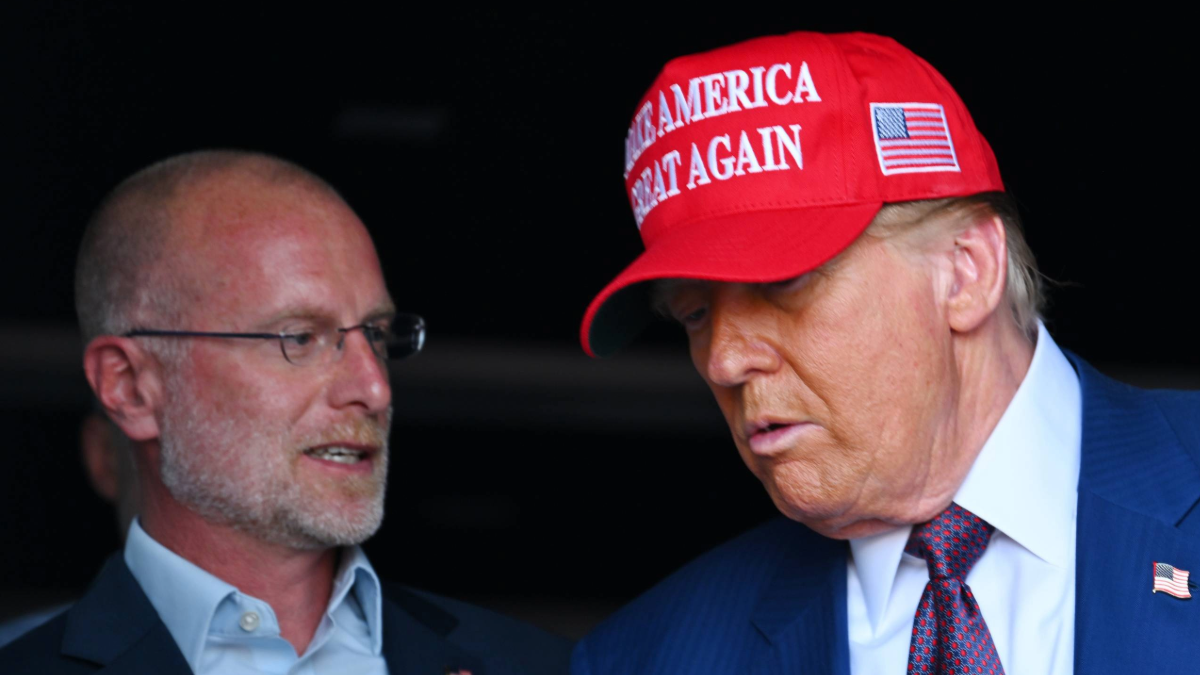Washington’s Double Standard on Free Speech
Mariana Olaizola Rosenblat / Apr 16, 2025Mariana Olaizola Rosenblat is a policy advisor on technology and law at the NYU Stern Center for Business and Human Rights.

BROWNSVILLE, TEXAS - NOVEMBER 19, 2024: Then US President-elect Donald Trump speaks to Brendan Carr, his pick for Chairman of the Federal Communications Commission, as he attends a viewing of the launch of the sixth test flight of the SpaceX Starship rocket. (Photo by Brandon Bell/Getty Images)
Since taking office on January 20, the Trump administration has pursued a concerted effort to portray foreign regulation of the US-based technology industry as both a tax on American companies and a threat to Americans’ freedom of expression. The new FCC Chairman, Brendan Carr, and other government officials have doubled down on the free speech argument. Taken at face value, the administration’s claims that EU and UK digital platform regulations could affect Americans’ speech merits serious assessment. However, these concerns ring hollow given the administration’s hostility to virtually any foreign regulation of US digital industries and—even more troubling—its direct crackdown on dissenting expression at home.
At the center of the current controversy are two foreign digital regulations: the EU’s Digital Services Act (DSA) and the UK’s Online Safety Act (OSA). The DSA covers a broad range of “intermediary services” and platforms, but its most demanding obligations target very-large online platforms and search engines, with penalties for noncompliance reaching up to 6% of global annual turnover. The UK’s OSA is even broader in scope, covering an estimated 100,000 services and sites, and imposes fines of up to £18 million or 10% of global revenue. Both regulations are fairly new—the DSA was passed in 2022 but did not go into full force until February 2024, and the OSA was passed in 2023 and is being phased in starting this year. Though the EU has launched several investigations under the DSA, to date, the EU has not taken any final enforcement actions.
Just as foreign regulators are preparing to enforce these measures, and companies are gearing up for compliance, the Trump administration is trying to halt them by threatening to impose “tariffs and taking such other responsive actions necessary to mitigate the harm to the United States.” Presumably, these would be additional targeted tariffs on top of the more general tariffs the administration announced last week. This stance is rooted in two central claims: that the regulations are “discriminatory, disproportionate” and anti-competitive, and that they have the potential to undermine “freedom of speech and political engagement.” It is worth examining each in turn.
The merits
On the question of fairness, although it is true that most of the companies facing large fines are US-based, this is due to objective, nondiscriminatory reasons: US tech companies dominate the global market. Eight of the top ten tech companies by market cap in 2025 are American. A law that (reasonably) imposes tougher obligations on the biggest, most influential companies is not necessarily discriminatory just because it affects a larger number of US firms. Moreover, the maximum fines of 6% or 10% of global revenue are presumably reserved for the most egregious violations, and enforcement agencies have discretion to impose smaller penalties—or none—depending on proportionality. Much depends on how the laws are enforced.
The freedom of expression argument is more complex. While it is an exaggeration to call the DSA and OSA “censorship laws,” both do regulate online content in ways that would likely be unconstitutional under the US First Amendment. The DSA’s 91 articles focus largely on transparency and procedural safeguards, which should have minimal impact on Americans’ speech. A handful of provisions, however, allow foreign government officials to order platforms to remove illegal speech (Article 9) and to compel very large online platforms and search engines to change their content policies (Articles 34, 35, and 36 in combination). Meanwhile, the UK’s OSA requires services to take proactive measures to prevent users from encountering illegal content (Section 10) and to shield children from other categories of harmful material—such as bullying, violence, and the more nebulous “non-designated content” (Sections 8 and 12).
Because none of these provisions have yet been enforced, their real impact on freedom of speech—particularly for Americans—remains uncertain. In general, it is entirely legitimate for a foreign jurisdiction to regulate its own information environment according to its national laws. Yet, on paper, these regulations could be applied extraterritorially. The DSA’s recitals (which guide implementation) allow for that possibility, although they specify that takedown orders should typically be restricted to the state issuing the order. The UK OSA’s extraterritorial scope is even less clear. Consequently, there is potential for speech that is protected by the US Constitution but deemed illegal or harmful abroad to be taken down. EU and UK regulators can remedy the uncertainty by issuing a clear statement about the territorial scope of the laws.
Zooming out
While the US administration’s claims that EU and UK digital platform regulations could affect Americans’ speech are not entirely baseless, it would be short-sighted to consider them in isolation without recognizing the broader context.
First, the Trump administration’s antagonism toward the DSA and OSA aligns with Republicans’ longstanding objections to platform moderation of harmful content, which they argue unfairly targets conservative viewpoints. By compelling platforms to strengthen their moderation systems, these regulations inevitably run counter to conservative efforts to prevent perceived “censorship” of their perspectives.
Second, and perhaps more critically, the administration’s accusations of foreign censorship are occurring at the same time that the US government is intensifying its own crackdown on disfavored speech. In recent weeks, the Trump administration has ordered the detention—without due process—of legal immigrants reportedly engaged in campus demonstrations, attacked law firms based on the cases and clients they represent, retaliated against academics because of the subject of their research, and punished news organizations merely because of the content of their reporting. Against this backdrop, the administration lacks credibility in presenting itself as a defender of Americans’ free speech.
Authors
